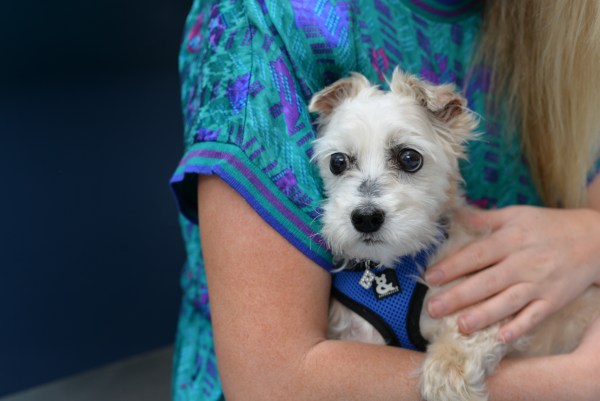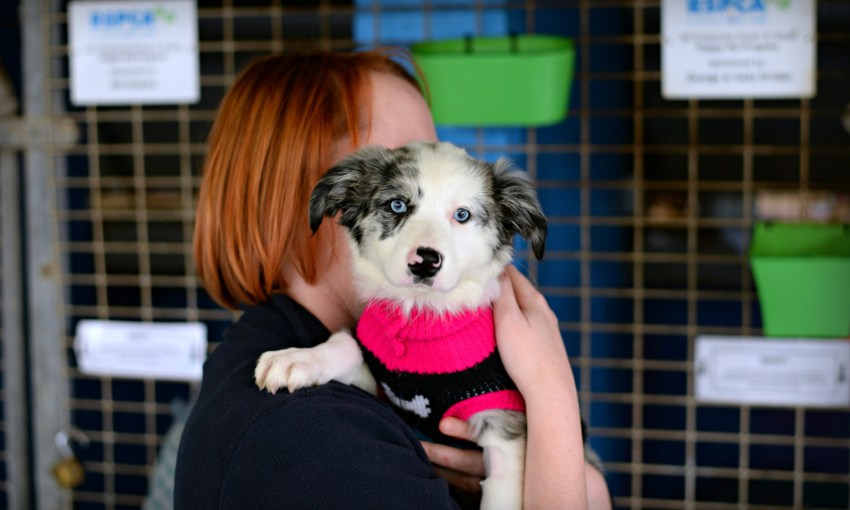While some pet crisis accommodation services do exist in South Australia, a bill that gives pet owners more power in the rental market could make it easier for survivors of domestic violence to leave abusive relationships.
Pet crisis accommodation is crucial in domestic violence support
Julie* was in an almost decade-long relationship with a violent partner who promised things would get better. They never did.
At the time, she lived with a menagerie of animals, both waterborne creatures and furry land-dwellers, and, to her, they were more than just pets.
If you’re concerned about your relationship or that of a friend or family member, contact 1800 RESPECT (1800 737 732), DV Crisis Line on 1800 800 098, or contact SAPOL on 131 444, or 000 in an emergency.
*Julie’s name has been changed to protect her identity.
They were her “best friends,” she tells CityMag, and a family at a time when she felt like she didn’t have one.
This made it difficult for Julie to decide to leave her partner, despite the hardship she was living through.
“I was happy to leave behind all my possessions, but never the animals,” Julie says.
“There are many responsible pet owners who include their animals as part of the family.”
Julie left her partner a couple of months ago. She successfully relocated her belongings to a storage facility, and organised to have her turtles stay at a friend’s house.
Housing her cat and two dogs, however, was much more challenging.
“My [domestic violence] caseworker could not offer me accommodation at their emergency shelter, although the units are a decent size with yard area, because they are not permitted pets onsite,” Julie says.
She successfully found temporary crisis accommodation for herself and was connected with the RSPCA SA’s Safe Kennels domestic violence program, which acts as a go-between for domestic violence services and animal shelters to help find emergency pet accommodation.
Safe Kennels also has a limited number of crisis accomodation beds of its own, where it is currently housing two dogs and seven cats, an RSPCA representative tells CityMag.
“The staff at the RSPCA were amazing; they were good with the animals and patient with me,” Julie says.
“[But] I cried all the way back to the city. I nearly changed my mind and went back to my partner because I knew it would be days, maybe weeks, before I could see [my pets] again, and I wanted there to be a different solution, but there wasn’t.
“I felt like I had given up everything and I didn’t want them to feel abandoned.”
When we speak, Julie is unsure when she will be reunited with her pets. Many rental properties in South Australia do not allow animals, and there’s little room for negotiation.
Crisis accommodation also doesn’t allow certain creatures.
On Thursday, SA’s Upper House discussed a bill introduced by Greens politician Mark Parnell, which aims to give pet-owners like Julie more power in the rental market.
Although he says the domestic violence angle didn’t occur to him when drafting the idea, it doesn’t surprise him people like Julie are having difficulty findings long-term or short-term accommodation.
On the whole, however, this bill aims to help all renters and animal lovers.
“I know enough people just in my circle of family and friends for whom their pets are their family,” Mark tells CityMag.
“You can sometimes scratch your head at the level of loyalty and commitment and money that people spend [on pets], vet bills and things, which all goes to show you that an awful lot of people have a massive attachment to their animals and would be devastated if they couldn’t have them.
“Often people are only one episode of unemployment away from not being able to live in their own home and having to rent [a home].”
Our state’s current landlord and tenancy laws allow a homeowner to stipulate no pets allowed on leasing contracts, with no wiggle room.
Mark told the Legislative Council in September the 2016 census showed 28 per cent of South Australians rent their home. And i f 61 per cent of households nationally have pets, a lot of South Australians are “affected by this growing problem,” he said.
The bill Mark introduced would also mean fewer pets would have to be relinquished to the RSPCA because of strict rental agreements.
An RSPCA spokesperson told CityMag there were 259 surrenders to the organisation’s SA branch due to rental reasons in the 2018-2019 financial year, and that number increased by more than 10 per cent in 2019-2020 to 293. The total number of surrenders for all reasons in 2019-2020 was 2,312.


(Above) Billie and (right) Peaches at RSPCA SA.
Mark wants tenancy laws to be changed so there’s a presumption for pets to be allowed, unless there’s a good reason for them not to be.
“And I fully accept that there’d be places where there is a good reason not to,” Mark says.
“If someone wants to have two Rottweilers in a one-bedroom apartment on the 10th floor… that’s not appropriate.
“But the point is that under the bill that I’ve got, at least if the tenant believes that the landlord’s being unreasonable in their refusal to allow a pet, then there’s an opportunity to go to the umpire and sort it out. That’s the tribunal.”
To discuss emergency accommodation for your pet, call RSPCA South Australia on 1300 477 722.
Mark hasn’t outlined specific criteria for the South Australian Civil and Administrative Tribunal to follow, but suggests they would look at issues on a case-by-case basis.
RSPCA Safe Kennels program officer Alicja Clisby supports the bill, saying the change would be in line with other Australian states.
In March, Victoria changed legislation to allow tenants to request the allowance of pets in rental properties, which landlords must not unreasonably refuse.
“So, we know it’s possible, and we think this change is really important,” Alicja says.
“We focus our work on collaborating with DV services, to make sure that [survivors] can include pets in their service delivery, so families can stay together.
“But obviously, DV services only work with their clients for a limited period of time. It’s only transitional accommodation – crisis accommodation.
“Some crisis accommodation may help people for up to three or six months, depending on the particular case, but those people have to have somewhere else to go after that. Not all of them may be qualifying for housing accommodation, some of them may need to be able to rent privately.”
Prior the South Australian bill being raised in Parliament on Thursday, 3 December, Mark told CityMag he wasn’t sure how a vote might go. But he’s optimistic it will at least start a conversation about our state’s pet rental laws.
“I’m realistic enough to know that it might not get through this time, but what we will have done is kicked off a broader debate,” he says.
“And there’ll be groups like the RSPCA who will put pressure on the government to bring something of their own.”
On Thursday, Rob Lucas told Parliament the government was prepared to support a further reading of the bill, which is expected to be discussed and possibly voted on in early 2021.
In reply, Mark is enthusiastic: “No one so far has denied the importance of animals in people’s lives.”
If this story raised issues for you, call LifeLine on 13 11 14. Beyond Blue and headspace are other national organisations that offer comprehensive mental health support.
If you’re concerned about your relationship or that of a friend or family member, contact 1800 RESPECT (1800 737 732), the DV Crisis Line on 1800 800 098, or SAPOL through 131 444 or 000 in an emergency.




